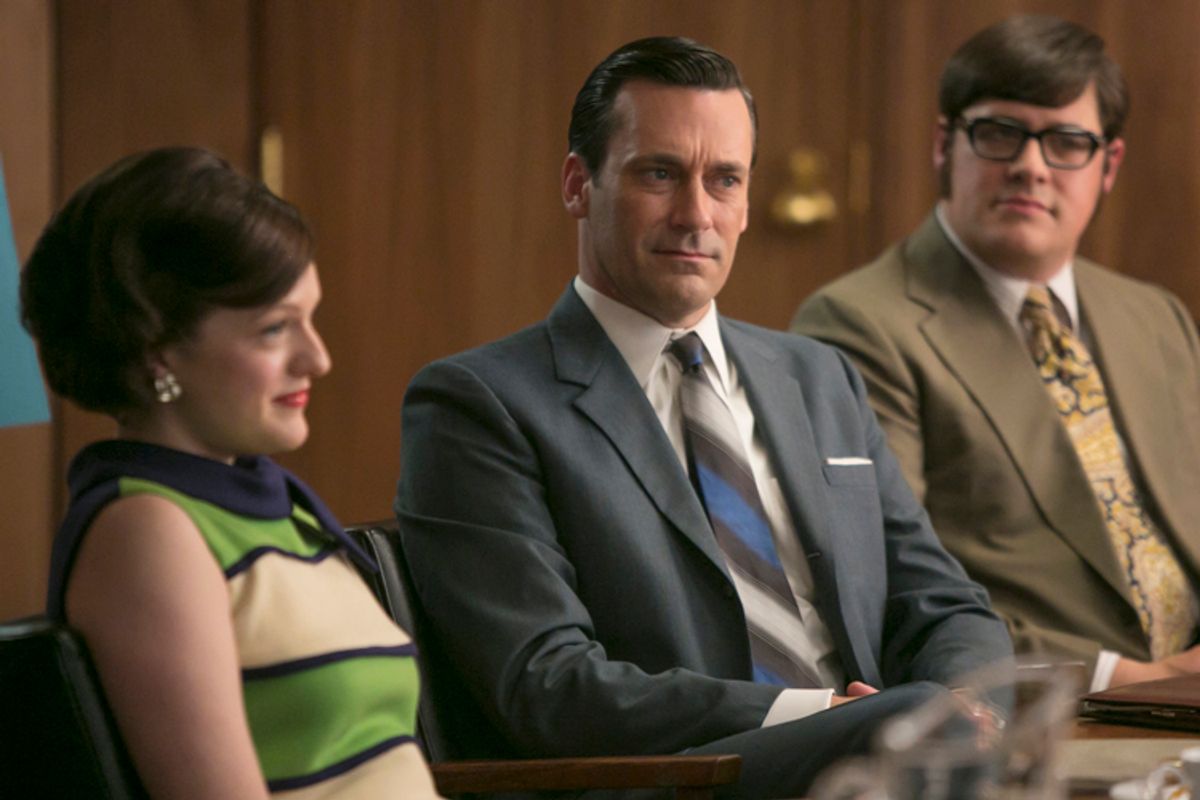Leaving an entire year between the first and second half of "Mad Men's" seventh and final season, creator Matthew Weiner has taken pity on his fans and helped them process the mid-season finale in an interview with Vulture. Weiner shared some of the writer's room conversations about computers and '60s-era advertising, responded to audience reactions, and provided insight into some of the episode's most captivating and puzzling moments (warning: spoilers ahead!).
On what Bert's dance to “The Best Things in Life Are Free” meant:
The fact that Robert Morse is one of the greatest song-and-dance men of all time and there was really never a way within the fabric of the show's reality to utilize that, yeah. I always wanted him to sing on the show. Roger says, "The last thing I said to him were the words of some old song." I guess that's sort of stuck in Don's head. Don would know that song. Don doesn't know that Bert dances. But for me, I picked that song and Bert's death during the moon landing from the beginning of the season to make a statement about the fact that this has been a striving for success on Don Draper's part in a very new way. He's working his way up in his own company and repairing his relationship with Peggy, which is where we started in the premiere, with them as far apart as possible. I wanted to add a little coda on the end of this event of selling the company. It's Don saying to himself, I guess in some weird way, money isn't everything.
Despite what you thought of that hotel room scene, there is nothing going on between Don and Peggy, and nothing romantic will happen between them:
I'm gonna admit it's not on our mind. To me that's more almost a cliché scene: It's backstage, she looks awful, he comes back and says, "The star's sick. You're gonna go on, kid." That's what I wanted it to feel like. We're in her dressing room and she says, "Did Harry tell you about my dream?" Again, it's about how real can you make it. Don comes to Peggy's bedroom? Maybe it's part of showing their relationship doesn't have that aspect to it.
And no, Don and Joan aren't friends, so why are you surprised that she voted Don out?:
I'm stunned as someone who lives with the constant reality of the show and the fans who demand that it stays consistent that people were surprised. I guess they love Don so much and they love Don and Joan so much, but I always look at it and ask, "Are you friends with the person who lost your lottery ticket for $1 million?" It was a big deal in season six. She was there when they put him on leave, and she was quite firm about it. Don's alcoholic disregard for her well-being — it was $1 million to go public, she slept with that guy so it would happen, and Don just impulsively merged the agencies, fired that guy, and cost her $1 million in 1968 money. If people can see it that way and wonder why Joan doesn't want that guy in the firm, maybe it will help.
What you think you know about computers and businesses in the 1960s is wrong:
The surface interpretation that I wanted to show was that the people who are there are quite aware that this computer coming in is going to change their life, and it's not all positive. It does the work of lots of people, and even though it's made by people, it's a terrifying thing. Looking back at the people at the time we think, Oh my God, they didn't know. They knew. It's a temptation to have everything depend on it [now]. We love our computers, we have them in our pockets, I'm talking to you on one right now, it's 90 percent of my entertainment. But in its giant bulky form, it was something very much related to work life. As much as discovering the world was round it reframed man's place in the universe. It made some things seem like they were happening outside of us.
The computer didn't make Ginsberg mentally ill. Ginsberg has always been mentally ill:
I was surprised some people were shocked about it. I guess you spend time with somebody and you don't expect it, but part of that story was it's been right there in front of you the whole time. The fact that he focused on the computer is something to be investigated when you talk about the history of schizophrenia. Before there were computers, there were still people who had this disease, who were getting messages from whatever, [but] technology is definitely something that they focus on because it's outside and it's huge.
Why he split the seasons:
The challenge for the season and ending the show is that it's new ground for me. I've never done it before, the writers have never done it before. I was not involved in the end of The Sopranos; I was a soldier, not a general. Everybody does it in their own way. What you don't want is a bunch of [scenes] checking in with people. The challenge is to continue to tell a story and hopefully people will feel that way when they see the second half of the season. All I can say is this split-season thing has made us really focus on the main characters, and there's more story left to tell.
Read the full interview at Vulture.



Shares